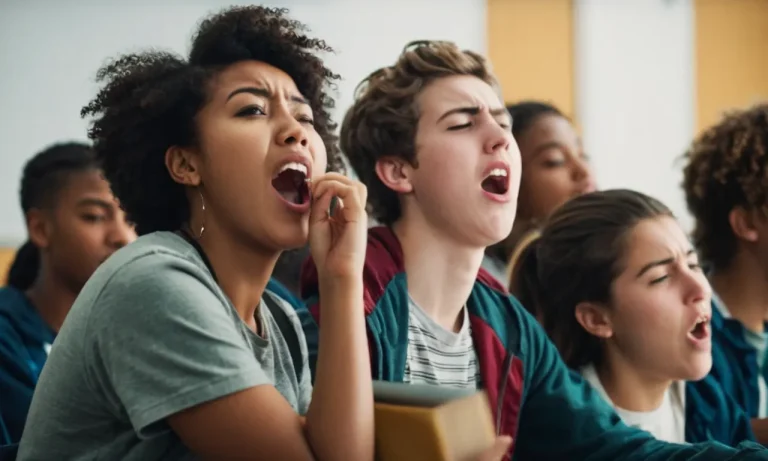In the world of high school, acronyms and slang terms are a common language among students. One such term that has gained popularity is ‘CP,’ but what does it actually mean? If you’re a parent, teacher, or student curious about this term, you’ve come to the right place.
If you’re short on time, here’s a quick answer to your question: CP typically stands for ‘College Preparatory’ in the context of high school courses or programs.
In this comprehensive article, we’ll delve into the meaning of CP in high school, explore its significance, and provide insights into the various contexts in which it is used. We’ll also discuss the importance of college preparatory courses and how they can benefit students in their academic journey.
Understanding the Term ‘CP’ in High School
As high school students navigate their academic journey, they often encounter various course levels and designations. One term that frequently arises is “CP,” which can leave some students and parents scratching their heads. Fear not!
In this comprehensive guide, we’ll unravel the mystery surrounding the CP acronym and its significance in the high school curriculum.
What Does CP Mean?
CP stands for “College Preparatory,” and it refers to courses designed to prepare students for the rigors of higher education. These courses are typically more challenging than standard or general education classes, offering a deeper exploration of the subject matter and a faster pace.
CP courses are intended to equip students with the knowledge, skills, and academic rigor necessary for success in college-level coursework.
The Significance of College Preparatory Courses
Enrolling in CP courses can be a game-changer for students aspiring to attend college. According to the National Center for Education Statistics, over 65% of high school graduates enroll in college within a year of completing high school. By taking CP courses, students can:
- Develop critical thinking and problem-solving abilities
- Enhance their writing and communication skills
- Gain exposure to more advanced concepts and topics
- Demonstrate their academic readiness to college admissions officers
Furthermore, many colleges and universities consider CP course participation as a positive factor in the admissions process, as it showcases a student’s commitment to academic excellence and preparation for higher education.
Don’t underestimate the power of CP courses – they can open doors to your dream college! 😎
Distinguishing CP from Other Course Levels
High schools often offer a range of course levels to cater to diverse student needs and abilities. Here’s a quick comparison to help you differentiate CP from other common course designations:
| Course Level | Description |
|---|---|
| General Education | Covers the basic curriculum and is designed for students who require additional support or have different educational goals. |
| College Preparatory (CP) | Prepares students for college-level coursework, with a more rigorous curriculum and faster pace. |
| Honors | Offers an even more challenging and in-depth exploration of the subject matter, often requiring additional assignments and projects. |
| Advanced Placement (AP) | Follows a standardized curriculum approved by the College Board, allowing students to potentially earn college credits by passing the AP exam. |
While CP courses may not be as intense as Honors or AP classes, they still provide a solid foundation for college readiness and can be an excellent choice for students seeking a balanced academic challenge.
Remember, the path to college success isn’t a one-size-fits-all journey. By understanding the significance of CP courses and how they fit into the bigger picture, you can make informed decisions about your high school course selections and pave the way for a rewarding college experience.
Embrace the challenge, and don’t be afraid to ask your school counselors or teachers for guidance – they’re there to support you every step of the way! 👏
Types of CP Courses and Programs
In high school, CP or “College Preparatory” courses are designed to prepare students for the rigors of college-level academics. These courses are typically more challenging than regular classes and cover material at a faster pace and in greater depth.
Let’s explore the different types of CP courses and programs offered in high schools:
CP English and Literature Courses
CP English and literature courses focus on developing strong reading, writing, and analytical skills. Students can expect to read and analyze a variety of literary works, from classic novels to contemporary poetry.
They’ll learn to craft well-structured essays, research papers, and persuasive arguments. These courses often cover advanced grammar, vocabulary, and rhetorical techniques. According to a study by the National Center for Education Statistics, over 60% of high school graduates in 2019 had taken an English course classified as CP or higher.
CP Mathematics and Science Courses
CP math and science courses are designed to challenge students and prepare them for college-level STEM (Science, Technology, Engineering, and Mathematics) courses. In CP math classes, students may study advanced algebra, trigonometry, and calculus.
CP science courses often cover subjects like biology, chemistry, and physics in greater depth, with a stronger emphasis on laboratory work and scientific inquiry. According to a report by ACT, only 26% of high school graduates in 2021 were ready for college-level STEM courses, highlighting the importance of CP courses in this area.
CP Social Studies and History Courses
CP social studies and history courses delve deeper into topics like world history, American history, government, economics, and geography. Students are often expected to analyze primary sources, conduct research, and develop critical thinking skills.
These courses may also cover advanced writing assignments, such as research papers and analytical essays. According to a study by the National Center for Education Statistics, around 50% of high school graduates in 2019 had taken a CP or higher-level social studies course.
CP Foreign Language Courses
CP foreign language courses are designed to help students develop proficiency in a second language, such as Spanish, French, German, or Mandarin Chinese. These courses often move at a faster pace and cover more advanced grammar, vocabulary, and cultural topics than regular language classes.
Students may be expected to engage in conversational practice, write compositions, and read literature in the target language. According to a study by the National Center for Education Statistics, around 20% of high school graduates in 2019 had taken a CP or higher-level foreign language course.
It’s important to note that the availability and specific offerings of CP courses may vary among high schools and school districts. Students should consult with their guidance counselors and teachers to determine the best course of study to meet their academic goals and prepare for college success.
Benefits of Taking CP Courses
Enrolling in College Preparatory (CP) courses during high school can provide a multitude of advantages for students looking to excel academically and prepare for the rigors of higher education. These challenging classes offer a rigorous curriculum designed to equip students with the skills and knowledge necessary to thrive in college-level coursework.
Preparing for College-Level Coursework
CP courses serve as a bridge between high school and college, exposing students to the depth and intensity of college-level material. By tackling advanced concepts and engaging in critical analysis, students develop the ability to manage a more demanding workload and hone essential study habits.
According to Edutopia, a leading education resource, CP courses “provide a taste of the independence, self-discipline, and academic rigor required for success in college.”
Developing Critical Thinking and Analytical Skills
CP courses go beyond rote memorization and emphasize the development of higher-order thinking skills. Students learn to analyze complex information, synthesize diverse perspectives, and formulate well-reasoned arguments.
These skills are invaluable not only for academic success but also for navigating the challenges of the real world. A study by the College Board found that students who took AP courses, which are similar in rigor to CP classes, scored higher on critical thinking assessments compared to their peers.
Enhancing College Applications and Transcripts
Completing CP courses demonstrates a student’s commitment to academic excellence and willingness to challenge themselves. College admissions officers often view CP courses as a positive indicator of a student’s preparedness for college-level work.
😊 According to CollegeRaptor, a leading college planning resource, “Taking advanced courses like AP or CP classes can boost your GPA and strengthen your college application.” Additionally, earning high grades in CP courses can increase a student’s chances of receiving scholarships and merit-based financial aid.
Exploring Potential Career Paths
CP courses often delve into specialized subjects, allowing students to explore potential areas of interest and gain exposure to different career paths. For example, a student interested in the medical field may take CP courses in biology, chemistry, and anatomy, providing them with a glimpse into the demands and challenges of pursuing a career in healthcare.
This early exploration can help students make more informed decisions about their future academic and professional pursuits. 👏
Choosing the Right CP Courses
Selecting the appropriate CP (College Preparatory) courses is a crucial decision that can significantly impact your high school experience and future academic pursuits. It’s essential to strike a balance between challenging yourself and avoiding burnout.
Here are some key considerations to help you navigate this process:
Assessing Your Academic Strengths and Interests
Before diving into the course selection process, take some time to reflect on your academic strengths and areas of interest. Are you a math whiz? Do you have a passion for literature or science? Identifying your natural talents and intellectual curiosities can help you choose CP courses that align with your abilities and keep you engaged.
According to a National Association for College Admission Counseling study, 68% of students reported that their interests were a significant factor in course selection.
Seeking Guidance from School Counselors
Don’t underestimate the value of consulting with your school counselors. These professionals are well-versed in the intricacies of course selection and can provide valuable insights based on your academic record, future goals, and the school’s offerings.
They can help you understand the prerequisites, workload, and potential challenges associated with each CP course, ensuring you make informed decisions. A study by the American School Counselor Association found that students who met regularly with their counselors had higher GPAs and were more likely to enroll in challenging courses.
Balancing Workload and Extracurricular Activities
While CP courses are designed to prepare you for college-level academics, it’s essential to strike a balance between your coursework and other commitments. Overloading yourself with too many rigorous classes can lead to stress, burnout, and potentially compromise your performance.
Consider your extracurricular activities, part-time jobs, and personal responsibilities when selecting your courses. A survey by the College Board revealed that 55% of students struggled to balance their academic and non-academic commitments.
Considering Future Educational and Career Goals
Your course selections should align with your long-term aspirations. If you have a specific college major or career path in mind, research the prerequisite courses and choose CP options that will prepare you for those fields.
For instance, if you’re interested in pursuing engineering, taking advanced math and science courses would be beneficial. Don’t forget to consult resources like BigFuture by College Board, which provides valuable insights into course planning for various career paths.
Remember, choosing the right CP courses is a personalized process that requires careful consideration of your strengths, interests, and goals. Don’t hesitate to seek guidance from your school counselors and trusted mentors.
With thoughtful planning and a balanced approach, you can set yourself up for success in high school and beyond. 👏😊
Conclusion
In conclusion, the term ‘CP’ in high school typically refers to ‘College Preparatory’ courses or programs designed to equip students with the knowledge and skills necessary for success in higher education.
These courses offer a rigorous curriculum that challenges students academically and prepares them for the demands of college-level coursework.
By understanding the meaning and significance of CP courses, students and parents can make informed decisions about their academic journey. Choosing the right CP courses can not only enhance college applications and transcripts but also foster critical thinking, analytical skills, and exploration of potential career paths.
Ultimately, the decision to enroll in CP courses should be based on individual academic strengths, interests, and future goals. With proper guidance and a balanced approach, students can leverage the benefits of CP courses to pave the way for a successful transition to college and beyond.






